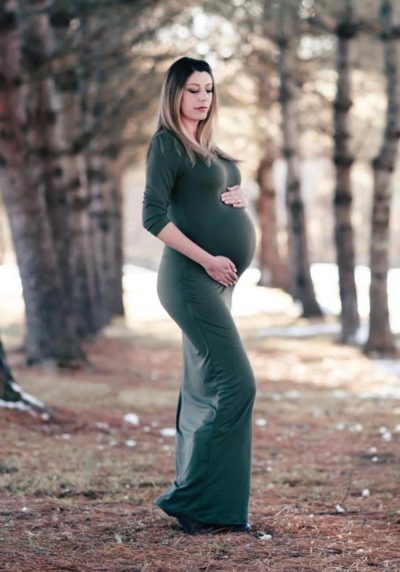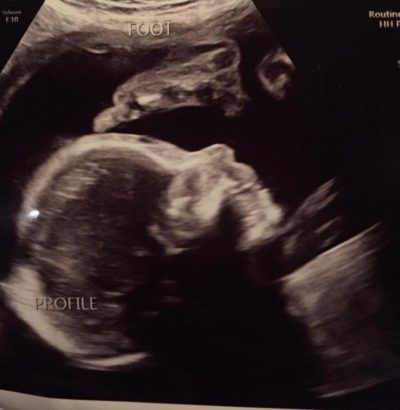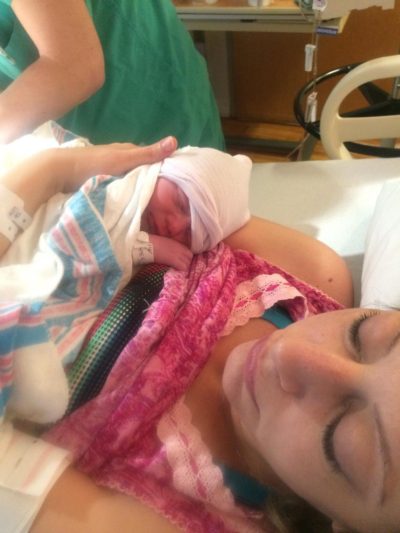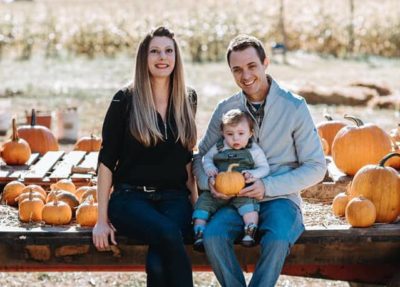Early Prenatal Klinefelter Diagnosis: The Voice of Nina Parrott
By Jennifer Ramsdell
Early Prenatal Klinefelter Diagnosis:
 At the age of 35, Nina found out she was pregnant. She had no idea she would soon learn about an early prenatal Klinefelter diagnosis. Given her age, her doctors labeled her as having a “geriatric pregnancy,” and she underwent a NIPT test at 11 weeks pregnant. Before the screening, she remembered filling out a form that asked, “Would you like to know the gender of the baby?” She ticked the box for “yes” and did not think much more of it. Five days later, Nina’s phone rang while she was at work.
At the age of 35, Nina found out she was pregnant. She had no idea she would soon learn about an early prenatal Klinefelter diagnosis. Given her age, her doctors labeled her as having a “geriatric pregnancy,” and she underwent a NIPT test at 11 weeks pregnant. Before the screening, she remembered filling out a form that asked, “Would you like to know the gender of the baby?” She ticked the box for “yes” and did not think much more of it. Five days later, Nina’s phone rang while she was at work.
An OB/GYN she was unfamiliar with stated she wouldn’t be able to inform Nina of the gender of the baby because there had “been some issues with the NIPT test.” The doctor said, “either it’s a girl, and everything is fine; there is a false positive, and it’s a baby with XXY, or sometimes the placenta carries different genetic coding than the baby. Outside, it isn’t my job to tell you anything else, so I have set you up with a genetic counselor.” Nina hung up and went to Google to learn more about what a prenatal Klinefelter diagnosis meant. She decided to wait until she got home to tell her husband the news.
Sharing the news:

When Nina’s husband got home, she relayed the potential diagnosis. His first reaction was not to jump to Google but to comfort Nina. He reassured her, saying, “whatever it is, it’s fine. We can handle this, and we can figure it out”. They set up an appointment with a genetic counselor in Asheville, North Carolina, to learn more. The genetic counselor they met with told Nina and her husband there was a 33% chance of their son having a prenatal Klinefelter diagnosis. Instead of doing further tests, like an amniocentesis, they would just wait until the baby was born to confirm the diagnosis of Klinefelter syndrome, or 47, XXY. Nina decided early on that termination would not be an option, though the genetic counselor had suggested it.
Continuing the pregnancy:
 Nina’s pregnancy carried on as expected, with frequent ultrasounds and exams to ensure that she and the baby were healthy. She relished seeing little Owen on the monitor, watching him grow, and seeing his tiny heart beating. She received constant confirmation that he was growing excellently. Sometimes Nina would find herself back on Google, trying to mentally prepare for the eventuality that she would have a son with KS. Late into her pregnancy, she found an old blog from 2001 about a mom whose son had Klinefelter syndrome and whose family looked great. That blog linked her with XXY Facebook groups, and eventually Ryan and Living With XXY.
Nina’s pregnancy carried on as expected, with frequent ultrasounds and exams to ensure that she and the baby were healthy. She relished seeing little Owen on the monitor, watching him grow, and seeing his tiny heart beating. She received constant confirmation that he was growing excellently. Sometimes Nina would find herself back on Google, trying to mentally prepare for the eventuality that she would have a son with KS. Late into her pregnancy, she found an old blog from 2001 about a mom whose son had Klinefelter syndrome and whose family looked great. That blog linked her with XXY Facebook groups, and eventually Ryan and Living With XXY.
Labor and delivery:
 At her 38-week appointment, Nina had high blood pressure and was diagnosed with preeclampsia. Doctors decided she should be induced to deliver baby Owen. The labor and immediately after the birth were complicated. Nina experienced a lot of sickness from the magnesium she was given and felt solid and flu-like symptoms. Her hospital was adamant that she breastfeeds and struggled to support Owen in those early days. Upon being released from the hospital, Owen began gaining weight, and the entire family felt much better.
At her 38-week appointment, Nina had high blood pressure and was diagnosed with preeclampsia. Doctors decided she should be induced to deliver baby Owen. The labor and immediately after the birth were complicated. Nina experienced a lot of sickness from the magnesium she was given and felt solid and flu-like symptoms. Her hospital was adamant that she breastfeeds and struggled to support Owen in those early days. Upon being released from the hospital, Owen began gaining weight, and the entire family felt much better.
A few days after Owen was born, Nina took him to a weight check appointment and was seen by a Physician’s Assistant. Nina wanted to talk to the PA about Klinefelter syndrome, but the PA was unfamiliar with the NIPT screening results. The family was sent to the hospital for further blood testing to confirm the prenatal Klinefelter diagnosis. A while back, Nina remembered seeing on a forum about how, when screening for KS, it is crucial to test 100 blood cells and not just the average 20/25 cells that most other blood screenings require. She advocated for that, and no doctors gave her much pushback. Seven days after Owen’s blood was drawn, the results came in: Owen has mosaic XXY, meaning 30% of his cells had XXY, and the other 70% were XY.
Follow-up care:
 After Owen’s diagnosis, the family met with a pediatric endocrinologist, who they now see yearly for a check-up and an evaluation of his bloodwork and testosterone levels. Based on his T levels, the family decided that they would not pursue early testosterone therapies at this time. The pediatric endocrinologist did explain that boys with KS can struggle with low muscle tone and speech delays. While Owen was hitting his developmental milestones and did not require physical or occupational therapy as a baby or toddler, Nina noticed his speech was delayed from the start.
After Owen’s diagnosis, the family met with a pediatric endocrinologist, who they now see yearly for a check-up and an evaluation of his bloodwork and testosterone levels. Based on his T levels, the family decided that they would not pursue early testosterone therapies at this time. The pediatric endocrinologist did explain that boys with KS can struggle with low muscle tone and speech delays. While Owen was hitting his developmental milestones and did not require physical or occupational therapy as a baby or toddler, Nina noticed his speech was delayed from the start.
At first, Nina’s regular pediatrician refused to give Owen a referral to a speech therapist, encouraging the family to wait it out and see how he progressed. People would tell Nina not to worry, saying, “he’s a boy, it’s normal,” or “it will happen.” During his three-year checkup, though, Nina filled out a form that evaluates developmental speech milestones. Owen had failed to meet many of them. At this point, the pediatrician gave them a referral for speech therapy. Owen has been in speech therapy for six months, and his language has improved tremendously.
What is Owen like?

Today Owen is a sweet and cuddly four-year-old. He loves to be the center of attention, is super goofy, andalways happy. One notable thing about Owen is his intelligence. He is so intelligent, charismatic, and has an incredible memory. At the age of three, he was assembling Lego kits designed for 10-year-olds. He also knows sign language and is expressive verbally and with his hands in sign. Owen loves sports, has excellent balance, and honestly can do whatever he puts his mind to.
What does Nina want newly diagnosed parents to know?
 Nina shared her story with the Living With XXY team because she was a pregnant mom with no information when she received the prenatal Klinefelter diagnosis. As more and more mothers are screened with a NIPT and find out they may have a son with KS, she wants to be a resource for them. Nina said, “whatever scary things you’ve seen online, I promise it will be ok.” She encouraged those with this new diagnosis to connect with other parents of XXY boys or the men in the community with Klinefelter syndrome to learn more about it and to find support.
Nina shared her story with the Living With XXY team because she was a pregnant mom with no information when she received the prenatal Klinefelter diagnosis. As more and more mothers are screened with a NIPT and find out they may have a son with KS, she wants to be a resource for them. Nina said, “whatever scary things you’ve seen online, I promise it will be ok.” She encouraged those with this new diagnosis to connect with other parents of XXY boys or the men in the community with Klinefelter syndrome to learn more about it and to find support.
Nina’s final advice is, “For every family, everything is different. Not every family will make the same decisions based on the same information. You need to do what works best for your family. A diagnosis doesn’t define anyone; your child will define who he is in life.”




This is so similar to our story with our baby Jace, except for the care team surrounding us. Termination was never once suggested and every single doctor/ specialist we’ve seen has been supportive, even while I was pregnant. I did not want an amnio and I advocated for the blood test in the hospital (NICU because he was born at 35+5) which was done, even though the doctor did not believe he had xxy, he listened to me. Our sweet boy has seen every specialist under the sun just to be sure, and for sure, he is thriving so far. He is almost 9 months old and has turned into the most adorable trouble maker now that he is crawling and so curious. His big brother is still figuring out how to deal with our mobile peace nugget, so there are some very normal sibling squabbles going on in our house. Thank you for sharing your story, I’m so sorry for all the pushback you’ve received, Owen seems like such a wonderful little boy.
Thanks for sharing, Julie! Supportive providers really make all the difference when it comes to how families and men with KS accept themselves. – Chelsea
Have s beautiful 10 month old ,no speech yet ,starting to crawl backwards